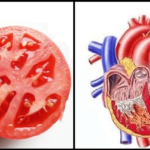The stress is a feeling of physical and emotional stress which is caused by the body’s reaction to the different situations or thoughts, usually caused by frustration, nerves or furies.
In moderate situations, stress can be positive since this reaction can prevent us from being in danger or some risky situation
. But when it manifests itself very strongly it can lead to various physical and emotional health problems.
Today with the modern style of so much work and turmoil, stress issues are increasingly on the rise, making it increasingly difficult to control.
In the worst case, most of those who suffer from it tend not to pay much attention to it and then end up paying the consequences.
Therefore, a recent study revealed that 40% of adults who are stressed regularly have trouble sleeping. And in case you did not know, stress is related to the alterations of some body organs that in turn decrease the quality of your life.
It is for this reason that today we bring you which are these organs most affected by stress.
The skin
Due to the tension caused by stress, this causes the skin to react giving an anti-inflammatory response which causes clogging of the pores. This tapering makes the skin red and makes way for cumule pus or sebum. As well as stress causes acne to appear on your face.
Lungs
These are affected by stress and tend to weaken and decrease their immune response to external agents. So a study at the University of Sao Paulo revealed that stress is closely related to asthma as it breaks the balance.
The heart
When you have permanent tension, stress is capable of increasing cholesterol in the blood, raising blood pressure, among others. Therefore people with too much stress on a constant basis are prone to developing these types of diseases.
The eyes
Recent research carried out at the European Ophthalmological Institute, was able to verify that excessive physical and emotional stress can cause tremors in the eyes because stress is able to excite a small muscle that fulfills the function of raising the eyelids. Furthermore this was related to inflammation and blurred vision.
The liver
The large accumulation of stress hormones is capable of producing alterations in the cells of the liver, these are known as cytolytics, which are responsible for destroying hepatocytes, thus causing the liver’s own diseases to flare up.
Brain
When you have too much stress this increases the production of a hormone called cortisol, which in excess negatively affects the frontal cortex of the brain, which is responsible for decision-making and memory.
The kidneys
This, like the brain, by increasing cortisol levels due to stress, can affect some organs due to the renal secretion of phosphate, which in turn can cause muscle weakness, bone disorders such as rickets, ect.
The intestines
In case you did not know, intestinal health has a great influence on all general health, so it is important to take good care of our digestive system, including the colon. Therefore, when there is a lot of stress, colon problems often appear, causing gas, abdominal pain and inflammation.
How should we combat excess stress?
If stress is already becoming a part of your lifestyle, we recommend the following guidelines for you to fight it and if possible eliminate it so that it does not affect your health so directly.
- Avoid bad habits like smoking and alcohol.
- Keep negative people away.
- Plan your activities according to the time you have available.
- Take time to pamper yourself and enjoy what you like.
- Improve your diet.
- During work, take a few breaks, stretch, and, if possible, get some fresh air.
- Practice exercise every day.
- Increase water consumption.
- Perform relaxation techniques such as meditating, doing yoga, dancing, taking a bath or enjoying aromatherapy.
These recommendations will undoubtedly help you combat stress and therefore have a life with much better quality.














